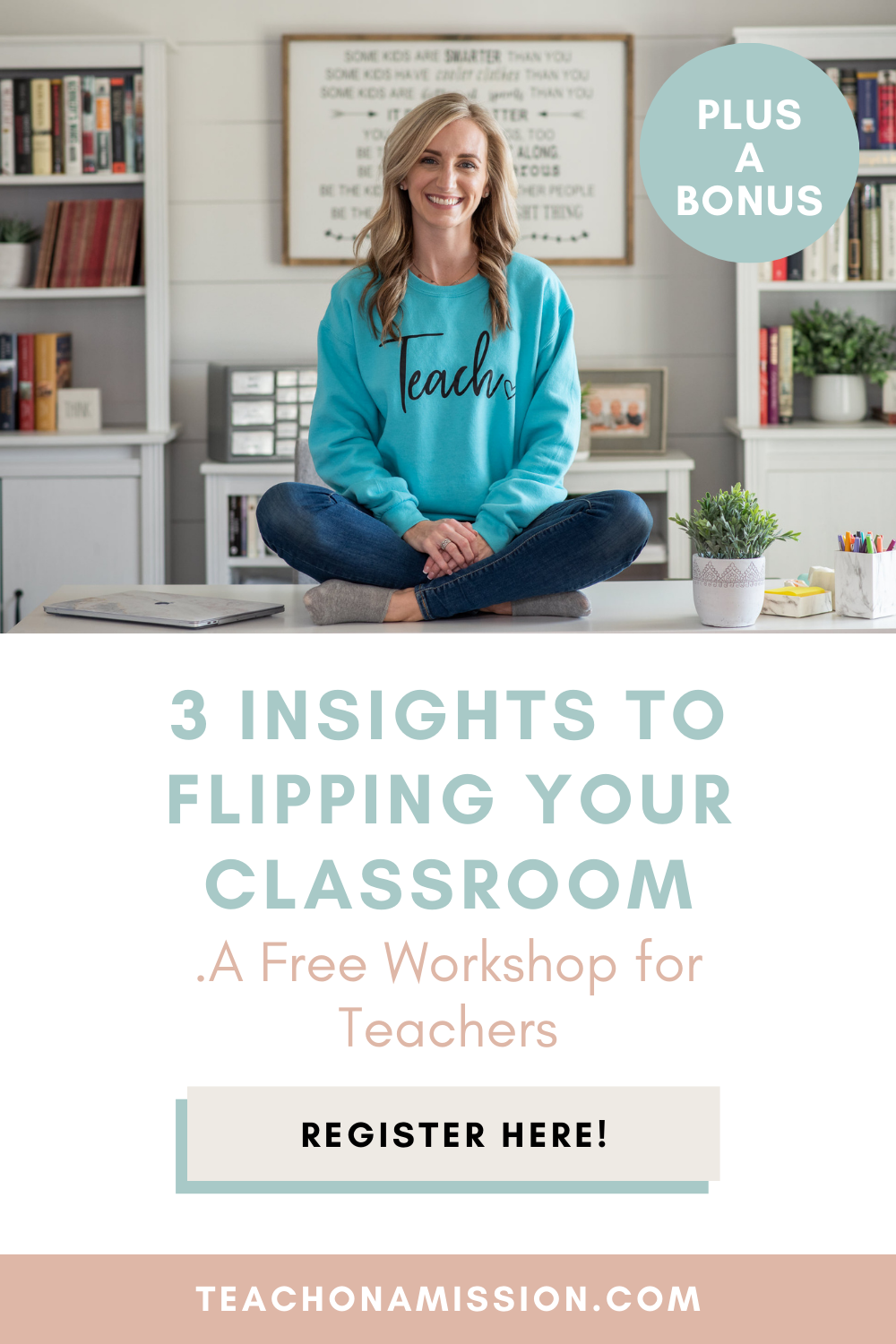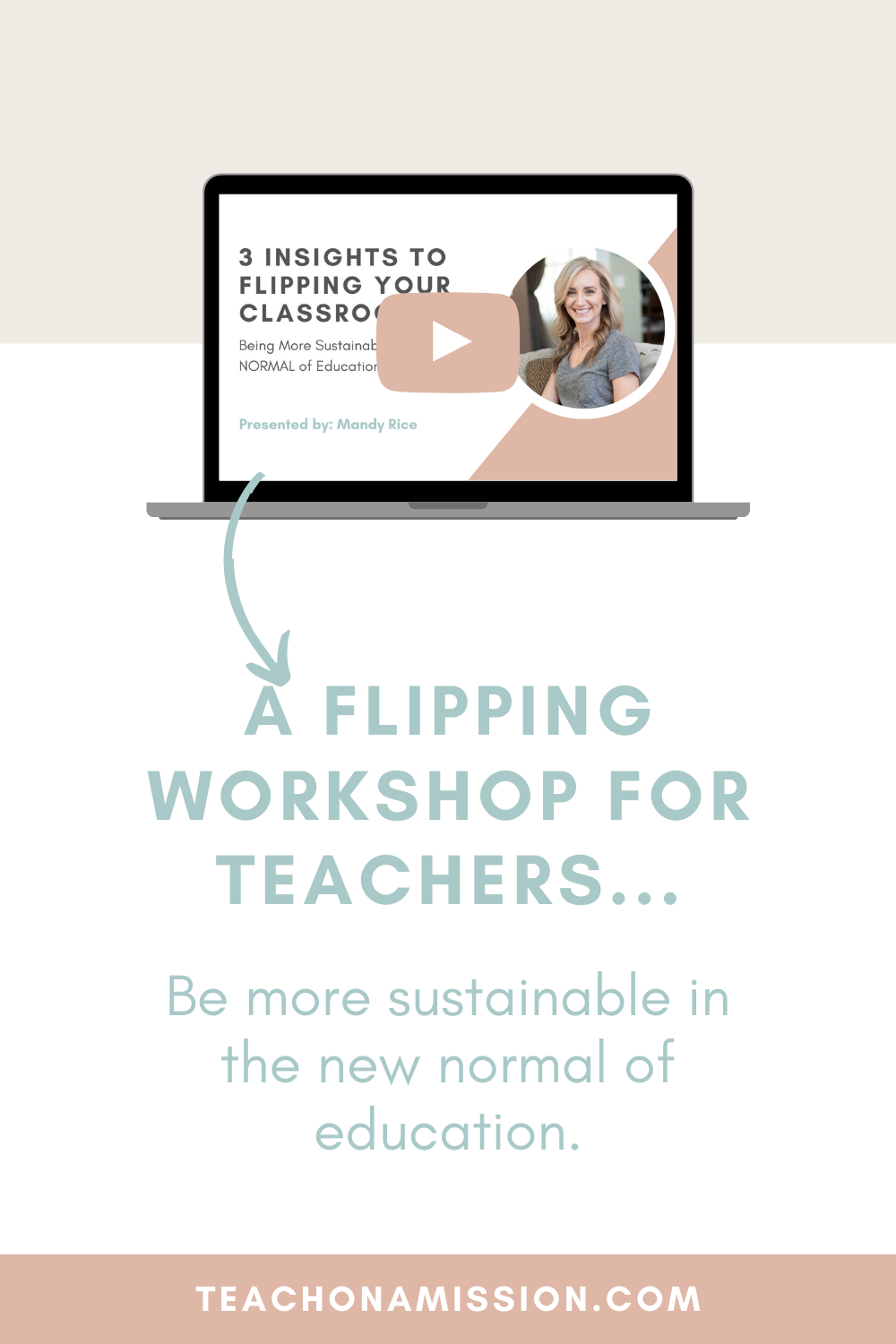The End Game of a Sustainable Teacher

Hi teacher-friend, I am Mandy Rice, if you don’t know me, I am the host of this podcast that I hope you’ve come to enjoy on your commute or maybe are brand-new to, and I’m glad you’re here to hear me out on this episode. So, like I said, Hi, I’m Mandy, and I am control freak. I am also a work horse, and am productivity obsessed.
Now, I’m sharing these things about myself because maybe you can relate, especially in your career and daily teacher-life, but also because I want you to know that as much as I preach streamline, reduce, fight for your own sustainability, I want you to know that when I say these things, I’m also speaking directly to myself.
Working for your own sustainability is a journey, not a destination. Meaning we will never arrive at one place where we look around and realize, “Ok, yes, my daily life is sustainable now.” I don’t know, maybe we will, but I for sure know that if we can say that to ourselves, we won’t last if we don’t continually do the work to prioritize our sustainability.
So, in this episode we are going to focus on the why behind sustainability, as in, what exactly are we after, what does sustainability mean and look like, and how will we know when we get there.
After listening to this episode you’ll feel empowered to own your teacher-life sustainability, knowing that you don’t HAVE to do all the things, but can feel confident in your effectiveness in the classroom now that you know the true end game of sustainability.
Let’s get to it.

As I was saying in the intro to this episode, I am a worker bee. And what I mean by this is that I am always, and I mean quite literally always looking for something to do, improve, maintain, create, organize, clean, etc.
I’m betting you know what this looks like. After you’ve accomplished quite a few things, and you sit down to rest whether at home on your couch, or at work at your desk, and it doesn’t take long for a few more things to creep into your mind almost like little buzzing alarms going off of other things you could be accomplishing or doing.
Well in this episode we are going to get real honest about that worker-bee nature, how to take advantage of it, and how to tame it for our own sake, but I want you to hear me when I say that just because I’m giving advice here doesn't mean that I’m fantabulous at the whole overcoming my work-horse nature.
I am LIGHT YEARS better than I was 10 years ago, and became even better as my kids got older and they’ve forced me to slow down. So I have recently had to come to terms with, both personally and in my spiritual journey, my innate and insatiable desire to always be doing something productive. Even when I'm playing with my kids - I get this overwhelming, anxious urge to do something worthwhile.

And I’m here to say that it comes to a point where we are our own worst enemy when it comes to reaching a desirable level of sustainability in our lives. At least I certainly have been.
So here’s what I want to tell you today - this is our big idea, and if you get nothing else from this episode, I want you to get this.
If sustainability is something you are striving for in your personal or professional life, always remember that we are not striving for sustainability and productivity just so that we then can get to more things to do. We are not being productive for productivity's sake. Instead, we are reaching for sustainability and productivity so that we can do the few things we are great at or that are important to us as best we possibly can.
I’ll say that again. We are striving for sustainability, not so that we can just add more to our plates. We are striving for sustainability so that we can be total rockstars in the few, but very important few, areas of our lives.
I want to share two pieces of advice or areas that might be spots to improve your sustainability, while overcoming that work-horse nature that so many teachers have.

Where are your Yeses?
What do you want to say yes to in your life? If you’re asked about each aspect or role and responsibility in your life (try to list them all, and maybe the big categories within each of them), which ones do you say a Hell Yes! To? Pardon my language, but this piece of advice is inspired by the quote, which originates from Derek Sivers, and that I first heard from Marie Forleo, “If it’s not a Hell Yes, it’s a No.”
What you could do here is take simply your teaching responsibilities, list them all out - ALL of them, including your extra-curricular and extra-teacher stuff like all those committees, departments, etc. And answer to your yourself if it’s a Hell yes or not.
I fully recognize there are areas of our life we have to say yes to even when we don’t feel overly ambitious or excited about them, but I like what Shonda Rhimes explains in her book, Year of Yes, there are ways to turn no’s into yeses. For instance, you may hate budgeting and all things money-handling, but you really want that new boat for trips to the lake, or would love to have routine days at the spa. Well, if you can get ahold of your budgeting and money-habits, it means you will eventually get to say yes to those big items you’d love to have or do.
So what does this look like in our teaching lives? I have a quote from you from Steve Jobs.
“People think focus means saying yes to the thing you've got to focus on. But that's not what it means at all. It means saying no to the hundred other good ideas that there are. You have to pick carefully. I'm actually as proud of the things we haven't done as the things I have done. Innovation is saying no to 1,000 things.”
Here’s what it is teacher-friend. You do NOT have to do all the things in your career and you do NOT have to do all the things in your classroom.

There are new and trendy things in education all the time, it doesn’t mean you have to say yes to them.
So when an idea or opportunity comes up - whether someone asks you to lead or join a group of some sort, or you find a new fandangular idea on Pinterest or Instagram - take caution. What will a yes to this mean for you? Because a yes in one area is a no to a lot of other things, so be careful where you are saying yes.
Getting back to the basics
Whoever said that getting back to the basics of quality teaching and learning was a bad thing? I don’t know about you, but I often felt the pressure in my classroom to always be creating, recreating, overhauling, and doing the next best thing.
I love some good innovation, and some great ideas that help us be effective with our students. But what I love more is sound teaching that results in solid learning, and an overall wonderful classroom experience for our students, and sometimes that means that you must prioritize your own sustainability so you can simply be available for your students.
This is one of my main messages behind the benefits of flipping your classroom, and something we dive deeper into in our 3 Insights to Flipping Your Classroom Workshop, which at the time of this recording is open for registration, so be sure to click in the show notes to save your spot.
But we don’t flip our classrooms just because flipping is the cool new trend. We don’t flip for flipping’s sake.
No, no. We have a very solid why for flipping, and it’s things like creating a student-centered classroom, increasing student engagement and accountability, being able to get to the fun and engaging parts of learning, etc. Flipping your classroom allows you to get back to the basics.
It focuses your students, and your daily teaching-life, back onto the content (not all the bells and whistles of wowing our students and Instagram every single day) in ways that are accessible to your kiddos. Which then frees up class time so that you can get to the fun and often messy process of learning in your classroom.
Getting back to the basics doesn’t mean “go be boring.” Not at all, it just means focus on the sound teaching and learning principles, delivering content in accessible and manageable ways for your students (and for you), so that diving deeper into the content, and embracing the messy parts of learning can be a sustainable process for all involved.
Alright, let’s do a quick recap here.
First, our biggest takeaway from this episode is that we are striving for sustainability, yes. But not just so that we can add more to our plates. We are striving for sustainability so that we can be total rockstars in the few, but very important few, areas of our lives.
Second, know where you are putting your yeses, and remember that a no to one thing is a yes to another. So what are you saying yes to?
Lastly, getting back to the basics, that is in teaching and learning is not only empowering for you and your students, but can be really fun as you embrace the messiness of learning.
And there you have it teacher-friend.
Now that you’ve listened to this episode I hope you feel empowered to own your teacher-life sustainability, knowing that you don’t HAVE to do all the things, but can feel confident in your effectiveness in the classroom, now that you know the true end game of sustainability.

P.S. Be sure to register for the free teacher workshop on flipping your classroom - an hour long training on being more SUSTAINABLE in our daily teaching lives so we can have more impact without sacrificing our evenings and weekends.




